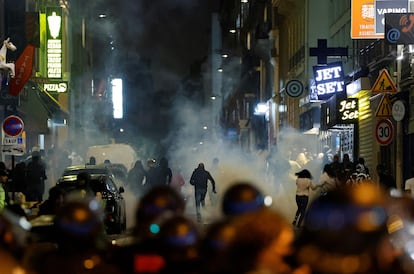The French government puts social media in the spotlight after the ‘banlieue’ riots
Apps like Snapchat and TikTok played a key role in the protests, but some experts believe these services cannot be held responsible for the outbreak of violence

Social media played a key role in the riots that rocked France over the last week. The wave of indignation and anger began after a widely circulated video in which a policeman can be seen shooting Nahel M., a 17-year-old teenager, at point-blank range on the outskirts of Paris. The crisis, which seems to have subsided for the moment, was reminiscent of the 2005 uprising in the French peripheries — the banlieues — which lasted three weeks. But there was one important difference: this time, social media played a key role in starting and spreading the protests. The French government, which has already cracked down on rioters through speedy trials, on Wednesday announced that it is considering restricting some social media functions if there are new episodes of street violence.
The video of Nahel’s death on Tuesday, June 27, was key in the outbreak of the protests because it refuted the police’s initial account. The officers had accused the young man of having tried to ram them with his vehicle, yet images recorded with a mobile phone showed that they were standing on the side of the car. The 38-year-old policeman who fired the shots has been charged with voluntary manslaughter and is in pretrial detention.
The spark lit a fuse in Nanterre, a city of 93,000 inhabitants in the Parisian banlieue where the incident took place, but it quickly spread to other towns in the impoverished French suburbs, inhabited mostly by the children and grandchildren of African immigrants. At the same time, all kinds of videos began to appear on social media showing cars and buses on fire, clashes with the police, store looting and, on occasion, ostentation of these acts.
Authorities said social media shared a responsibility in organizing the protests and asked for their collaboration. “Social platforms and networks played a considerable role in events,” French President Emmanuel Macron warned on Friday. “We have seen the organization of violent meetings and we have observed a form of mimicry of violence,” he added, citing TikTok and Snapchat, whose interactive map service, Snapmap, allows users to show in real time the places where events are occurring.
That same day, the Ministers of the Interior, Gérald Darmanin, and of Digital Transition, Jean-Noël Barrot, met with the representatives in France of Meta, Twitter, Snapchat, and TikTok to ask them to remove certain content and identify any users who committed offenses.
"We are going to break the accounts"
The average profile of the people who participated in these latest riots differs from that of 2005, although there is still no precise portrait. According to the Minister of the Interior, the average age was 17 years, although there were kids as young as 12 or 13. “These are generations that grew up with the internet and social media,” said Yasmina Buono, an educational consultant at Net Respect, an organization that investigates the influence of social media on the behavior of young people.
In fact, 30% of those arrested in recent days were minors, according to figures released on Saturday by the Minister of Justice, Éric Dupond-Moretti, who also warned about the copycat effect resulting from sharing content about acts of violence. Speaking on television, the minister issued a warning to let them know “that we are going to break the accounts. The judicial authority may, upon request, ask the operators to hand over the IP addresses.”
A week after the events, the matter is still in the spotlight of the authorities. The government spokesman, Olivier Véran, declared this Wednesday that the executive was analyzing the possibility of “suspending” some functionalities of social media networks, such as geolocation. “You have, for example, geolocation functions on certain platforms, which allow young people to meet up in certain locations … [while discussing] how to set fires [...] These are calls for the organization of hatred in the public space, and there you have the authority to suspend [social media features].”
His statements came the day after a meeting that Macron held with more than 100 mayors of towns hit by the violence. During the meeting, the head of state spoke of the possibility of “regulating or cutting” social media functionalities in extreme cases, according to Agence France Presse.
Following the commotion caused by his statements, the Élysée qualified that Macron had meant “being able to temporarily suspend social media as needed.” The Minister of Digital Transition has proposed setting up a working group to discuss the measures to be taken in the event of new disturbances, which could be included in a future legislative bill for digital security.
Signs of unease
Romain Huët, a specialist in communication at Rennes 2 University, notes that social media played an important role in making anger visible, but believes that we must reflect on “what these gestures say, this violence, this destruction of the state of the world.” “When very young children lash out at the police with such determination, it is a sign that something is very wrong.”
And he adds: “We will have to ask ourselves how it is possible that participating in such violence or looting arouses such a collective frenzy. It says something about the way some people relate to the world.”
Buono, from Net Respect, agrees: “At a given moment, we find ourselves with young people who view it more as a challenge [...]. As in ‘I am also going to show everyone that I participated.’ That raises a lot of questions. Is life online more important to these young people than real life? Does online life offer more opportunities than real life?”
Sign up for our weekly newsletter to get more English-language news coverage from EL PAÍS USA Edition
Tu suscripción se está usando en otro dispositivo
¿Quieres añadir otro usuario a tu suscripción?
Si continúas leyendo en este dispositivo, no se podrá leer en el otro.
FlechaTu suscripción se está usando en otro dispositivo y solo puedes acceder a EL PAÍS desde un dispositivo a la vez.
Si quieres compartir tu cuenta, cambia tu suscripción a la modalidad Premium, así podrás añadir otro usuario. Cada uno accederá con su propia cuenta de email, lo que os permitirá personalizar vuestra experiencia en EL PAÍS.
¿Tienes una suscripción de empresa? Accede aquí para contratar más cuentas.
En el caso de no saber quién está usando tu cuenta, te recomendamos cambiar tu contraseña aquí.
Si decides continuar compartiendo tu cuenta, este mensaje se mostrará en tu dispositivo y en el de la otra persona que está usando tu cuenta de forma indefinida, afectando a tu experiencia de lectura. Puedes consultar aquí los términos y condiciones de la suscripción digital.









































